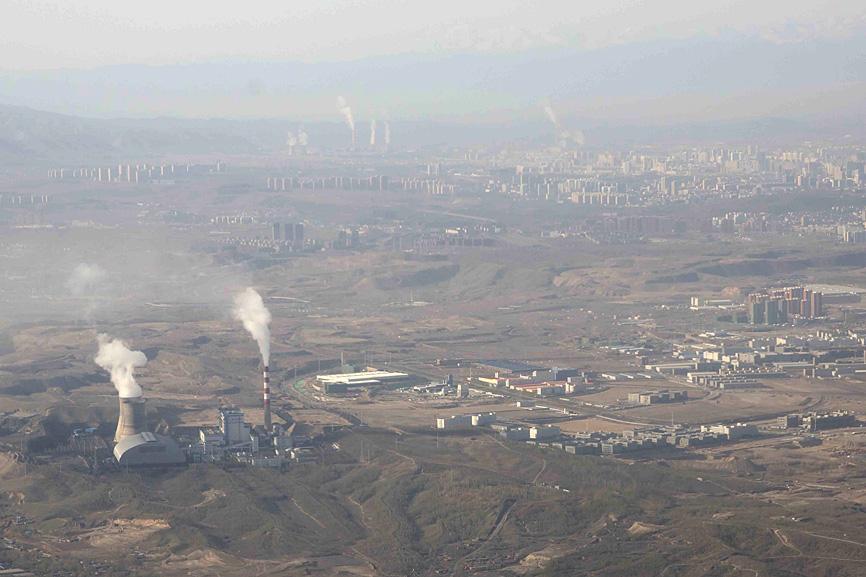China is promoting coal-fired power as the Chinese Communist Party (CCP) tries to revive a sluggish economy, prompting warnings that Beijing is setting back efforts to cut climate-changing carbon emissions from the biggest global source.
Official plans call for boosting coal production capacity by 300 million tonnes this year, news reports have said.
That is equal to 7 percent of last year’s output of 4.1 billion tonnes, which was an increase of 5.7 percent from 2020.

Photo: AP
China is one of the biggest investors in wind and solar, but jittery leaders called for more coal-fired power after economic growth plunged last year and shortages caused blackouts and factory shutdowns. Russia’s invasion of Ukraine added to anxiety that foreign oil and coal supplies might be disrupted.
“This mentality of ensuring energy security has become dominant, trumping carbon neutrality,” said Li Shuo (李碩), a senior global policy adviser for Greenpeace. “We are moving into a relatively unfavorable time period for climate action in China.”
Officials are facing political pressure to ensure stability as Chinese President Xi Jinping (習近平) is preparing to try to break with tradition and award himself a third five-year term as CCP leader in the autumn.
Coal is important for “energy security,” Cabinet officials said at a meeting on Wednesday, where they approved plans to expand production capacity, business news magazine Caixin reported.
The CCP is also building power plants to inject money into the economy and revive growth that sank to 4 percent in the final quarter of last year, down from the full year’s 8.1 percent expansion.
The CCP has rejected binding emissions commitments, citing its economic development needs, and Beijing has avoided joining governments that promised to phase out use of coal-fired power.
In a 2020 speech to the UN, Xi said China’s carbon emissions would peak by 2030, but he announced no target for the amount.
China aims for carbon neutrality by 2060, Xi said.
China accounts for 26.1 percent of global emissions, more than double the US’ share of 12.8 percent, the World Resources Institute has said.
China emits more than all developed economies combined, research firm Rhodium Group has said.
China’s goal of carbon neutrality by 2060 appears to be on track, but using more coal “could jeopardize this, or at least slow it down and make it more costly,” Clare Perry, ocean and climate campaign leader at the Environmental Investigations Agency said in an e-mail.
Promoting coal would make emissions “much higher than they need to be” by the 2030 peak year, Perry said. “This move runs entirely counter to the science.”

MAKING WAVES: China’s maritime militia could become a nontraditional threat in war, clogging up shipping lanes to prevent US or Japanese intervention, a report said About 1,900 Chinese ships flying flags of convenience and fishing vessels that participated in China’s military exercises around Taiwan last month and in January last year have been listed for monitoring, Coast Guard Administration (CGA) Deputy Director-General Hsieh Ching-chin (謝慶欽) said yesterday. Following amendments to the Commercial Port Act (商港法) and the Law of Ships (船舶法) last month, the CGA can designate possible berthing areas or deny ports of call for vessels suspected of loitering around areas where undersea cables can be accessed, Oceans Affairs Council Minister Kuan Bi-ling (管碧玲) said. The list of suspected ships, originally 300, had risen to about

DAREDEVIL: Honnold said it had always been a dream of his to climb Taipei 101, while a Netflix producer said the skyscraper was ‘a real icon of this country’ US climber Alex Honnold yesterday took on Taiwan’s tallest building, becoming the first person to scale Taipei 101 without a rope, harness or safety net. Hundreds of spectators gathered at the base of the 101-story skyscraper to watch Honnold, 40, embark on his daredevil feat, which was also broadcast live on Netflix. Dressed in a red T-shirt and yellow custom-made climbing shoes, Honnold swiftly moved up the southeast face of the glass and steel building. At one point, he stepped onto a platform midway up to wave down at fans and onlookers who were taking photos. People watching from inside

Japan’s strategic alliance with the US would collapse if Tokyo were to turn away from a conflict in Taiwan, Japanese Prime Minister Sanae Takaichi said yesterday, but distanced herself from previous comments that suggested a possible military response in such an event. Takaichi expressed her latest views on a nationally broadcast TV program late on Monday, where an opposition party leader criticized her for igniting tensions with China with the earlier remarks. Ties between Japan and China have sunk to the worst level in years after Takaichi said in November that a hypothetical Chinese attack on Taiwan could bring about a Japanese

The WHO ignored early COVID-19 warnings from Taiwan, US Deputy Secretary of Health and Human Services Jim O’Neill said on Friday, as part of justification for Washington withdrawing from the global health body. US Secretary of State Marco Rubio on Thursday said that the US was pulling out of the UN agency, as it failed to fulfill its responsibilities during the COVID-19 pandemic. The WHO “ignored early COVID warnings from Taiwan in 2019 by pretending Taiwan did not exist, O’Neill wrote on X on Friday, Taiwan time. “It ignored rigorous science and promoted lockdowns.” The US will “continue international coordination on infectious